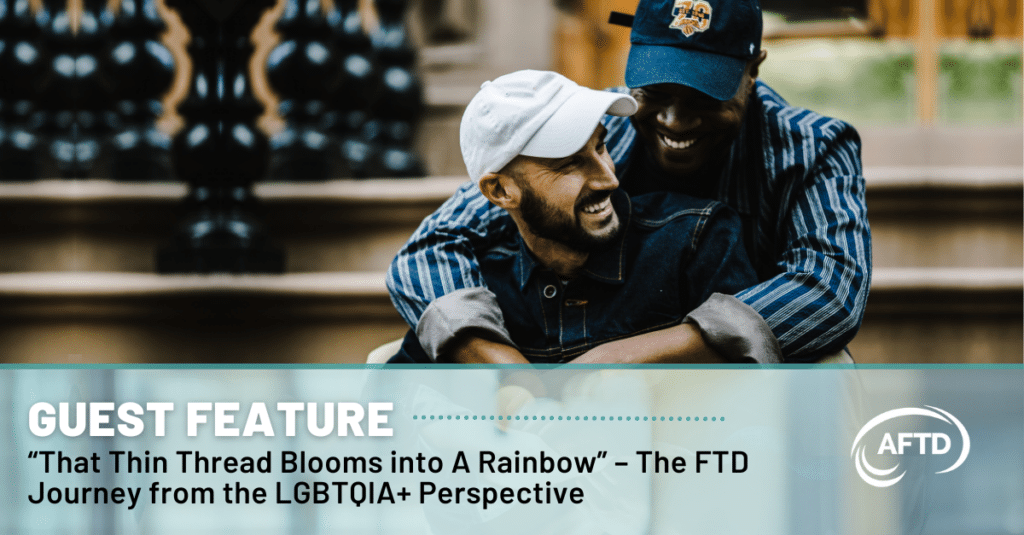Guest Feature: “That Thin Thread Blooms into A Rainbow” – The FTD Journey from the LGBTQIA+ Perspective

The FTD journey is wrought with hardships, with families often facing a lengthy diagnostic process, steep costs for proper FTD care, and feelings of isolation. But some living with FTD face added difficulty.
Members of the LGBTQIA+ community might also contend with hardships related to their sexual orientation or gender identity. For care partner Richard Ruben and his husband Hokan, discrimination can happen even during basic doctor’s appointments. AFTD sat down with Ruben to discuss FTD from his perspective and hear about the insights he had to share.
Getting diagnosed is an often frustrating and time-consuming part of the FTD journey. For Ruben, stigma and discrimination have created additional obstacles. Ruben has had doctors talk past him during consultations, not treating him as a care partner.
“We’ve been legally married for 12 years now – I also have all the paperwork to give me power of attorney,” said Ruben. “When I fill out paperwork at the doctor’s office, for ‘relationship to patient,’ I check ‘spouse.’ When I get the report back, it says ‘accompanied by his friend’; sometimes it’s ‘his partner’ or ‘his companion.’”
Home care has been another obstacle for Ruben and Hokan, who live in a rural community. While part of the difficulty stems from COVID-related disruptions to the healthcare system, the majority originates from the discrimination Ruben and Hokan experienced. Ruben told AFTD that he has worked hard to combat negativity by creating an atmosphere of love in his home. “While I get frustrated along the way, for Hokan, I try to constantly present love and positivity,” Ruben added. “Negativity feeds a loop; love and positivity stops that loop.”
Eventually, Ruben found a memory care group familiar with FTD that embraced him and Hokan for who they are. But additional challenges remained. Tasks aimed at keeping Hokan active, such as the couple’s daily walks through the park, were also fraught with difficulties specific to their experience as a same-sex couple.
“As we walk, for his safety and stability, I’m holding him – his hand, the small of his back,” said Ruben. “The entire time, though, my eyes are darting – I’m always conscious of who’s in the park with us and what is the look that I receive from them.” Hokan, due to his FTD, does not seem to perceive these incidents. “He’s unaware – his aperture is so tight that he doesn’t see it,” Ruben said.
Caring for his husband with FTD has re-ignited the advocate in Ruben. The couple participates in research, and the made the decision to donate Hokan’s brain to help prevent others from having to experience FTD as they have. However, Ruben says he also advocates for the civil rights of the wider LGBTQIA+ community, knowing all too well the increasing discrimination others face.
Other members of the LGBTQIA+ community share similar anxieties. Academics studying the experiences of gay, lesbian, and trans people in dementia care have highlighted a considerable need for better training to make dementia care more inclusive.
According to Ruben, one of the best ways to help LGBTQIA+ care partners and people with FTD is to create a better safety net for everyone on the FTD journey. He especially noted the need for care partner-specific support, such as a stipend to help offset rent and other costs.
“I still got a lot of years ahead of me after this, though – but the federal standard doesn’t seem to care that FTD can leave you indigent,” said Ruben. “I think relieving that stress on all caregivers is vital. It doesn’t matter who you are; we all deserve to at least know we can survive to see the other side of this.”
Ruben says that national healthcare reform is also necessary to create a “safety net for humanity” that adequately address the needs of care partners and people with FTD, especially in light of the high cost of proper FTD care. Ruben highlighted the experience of his mother-in-law, who lives in Sweden, Hokan’s country of origin. Ruben notes that while his mother-in-law is 90 and nearing the end of her life, Sweden’s healthcare system provides her with excellent comfort and care, including a minimum of three to four visits per day at home.
Ruben also hopes for better understanding from those around him, as needless division only worsens the pain of the FTD journey. “We’re all alike, we’re all suffering – my suffering is no different from anyone else’s suffering,” Ruben said. “It’s unfortunate we all find ourselves in this boat, paddling against a current, but let’s not start dividing the seats. I shouldn’t be relegated to this seat – take the available seat, and let’s paddle together. It’s the collective that gets to the end successfully.”
AFTD is committed to diversity, equity, and inclusion in our work. If you are struggling to find care for your loved one with FTD due to your sexual orientation, please reach out to AFTD’s HelpLine at 1-866-507-7222 or info@theaftd.org for assistance.
By Category
Our Newsletters
Stay Informed
Sign up now and stay on top of the latest with our newsletter, event alerts, and more…
